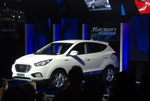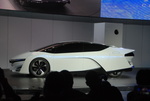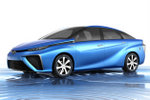Hyundai, Honda, Toyota Lead With Zero Emission Contenders

Electric cars running on hydrogen, creating their own electricity as they drive, are officially no longer the cars of the distant future. As Hyundai Motor America president and CEO John Frafcik said last week: “The future is much closer than you think.” Come spring, you can go to a select Southern California Hyundai dealer (one near the growing hydrogen station infrastructure), put down $2999 and drive away in a Tucson fuel cell car, a compact SUV with water as its only tailpipe emission, a 300-mile range on a tank of free (for the life of the $499/month loan) fuel, and free Concierge Service (like that offered with the Equus model). In other words, Hyundai is ushering in the hydrogen age and doing its best to make it an easy transition for the early adopters who choose to shift to zero emission driving. It made the announcement at the Los Angeles Auto Show, creating a stir among the more mundane introductions of conventional cars and trucks.
Hyundai, which has made a commitment to produce several thousand Tucson FCEVs on the same assembly line as its gas-powered cousin, is not alone as both Honda and Toyota will have their own fuel cells on sale in 2015. Both companies showed off concept cars hinting at the look of their 2015 FCEV sedans. Honda’s car, shown at the LA Auto Show a few hours before Hyundai’s announcement, was a futuristic design that will probably be tamed down for production, but clearly takes a page from its initial foray into hybrids with the 2000 Insight. Toyota’s FCEV, which was introduced at the Tokyo Auto Show, featured more conventional styling but carried the same promise as Hyundai of a consumer-friendly market approach.
Others Will Join In The Fuel Cell Parade
Of course, Mercedes, General Motors, Nissan, Ford, BMW and Volkswagen are not far behind the three leaders. All have their fuel cell cars ready to roll out (and some have done limited marketing as have Hyundai, Honda and Toyota) and are expected to hit the market prior to 2020.
The big hang up for fuel cells has been the refueling infrastructure. Unlike pure electric cars, which can rely on the ubiquity of electricity for easy, if slow, refueling, FCEVs need a network of stations to truly become a technology that can replace the internal combustion engine. Governments in Germany, Japan and Korea (and a few other spots in the world) have committed to build that infrastructure and California fell in line this year when it passed a bill to fund up to 100 stations, most of which will be located in Southern California where the cars will see their initial rollout.
Early adopters opting for the 2015 Tucson FCEV will get quite a deal. For comparison, we ran the numbers for a base gas-powered 2014 Tucson in Southern California. A 36-month lease with $2,999 down would give you $544/month payments – and you’d have to pay for your own gas and service!
Honda and Toyota didn’t have the retail details that Hyundai offered, but they made it clear that 2015 would be the introduction date of their fuel cell vehicles, which in the U.S. also will be targeted to the Southern California region with an infrastructure to support the cars.
The Hyundai Fuel Cell Deal
At the introduction, Hyundai’s Krafcik ticked off the advantages his company sees in fuel cell vehicles, compared with pure battery electrics. He also said there was plenty of room in the market for both types of zero emission vehicles, but FCEVs offered:
- Driving range of 300 miles,
- Capable of refueling in less than 10 minutes,
- Minimal reduction in daily utility compared with its gasoline counterpart,
- Minimal cold-weather effects, and
- Extensive crash, fire and leak testing.
What fuel cells share with battery electrics is instantaneous torque from its electric motor, good daily reliability and long-term durability, few moving parts, quiet operation and zero greenhouse gas emissions from operation. Krafcik noted that a UC Irvine study done this year found the well-to-wheels emissions of fuel cell vehicles to be lower not only than gas or diesel vehicles, but also battery electrics.
In addition to the straight sales pitch, Krafcik also said that the Tucson FCEVs will be available as rentals through Enterprise.
Honda Fuel Cell Concept

Honda, while adamant about the 2015 launch of its next generation fuel cell car, was less committal about planned volumes or price at the LA Auto Show. Honda has been leasing its FCX Clarity fuel cell for several years, but in very small volumes. Honda reviewed its history getting the public into its fuel cell cars, noting that the next generation’s fuel cell stack (the “engine” for an FCEV) will have a 60 percent power density improvement over the one used in the Clarity. The stack also is 30 percent smaller than its predecessor and costs have been reduced.
The Honda FCEV is a five-passenger sedan, similar in exterior size to its current FCX Clarity, but with a more spacious interior because of the smaller fuel cell stack. Honda didn’t release exterior dimensions of the concept, but said its stack would yield more than 100 KW of power output and would deliver a driving range of more than 300 miles.
Toyota Fuel Cell Concept
Like Honda, Toyota chose an auto show to unveil a concept version of the fuel cell sedan it will launch in 2015. The Camry-size four-passenger sedan, unveiled at the Tokyo Motor Show last week, is a less radical design than Honda’s, appearing to be much closer to the production intent for the production version. Its released dimensions indicate it is slightly longer overall than a Camry (191.7 inches compared to 189.2 for for the Camry), has a wheelbase that is almost identical and is about a half-inch narrower. Toyota said its new fuel cell stack has a power density similar to Honda’s at 3 kW/liter, which they said represents more than twice that of its current stocks. The company also claimed reduced size and costs. Automotive News quoted Toyota officials as saying that fuel cell cars by 2020 will cost roughly the same as a plug-in hybrid to produce.

More Stories On This Subject:
Suddenly Hydrogen Cars Are Back
Hyundai To Produce 2,000 Fuel Cell Cars
Hydrogen Fuel Cell Buses In Service

Hydrogen Fuel cell cars i hope market going up with this
@Hharry,
Right now this is a very California-centric happening, but fuel cell cars (Hyundai Tucson) are on sale in limited numbers right now. Toyota, Honda and Mercedes coming next year. It will be interesting to watch, as well as similar activity in Korea, Japan and Germany. –ed.